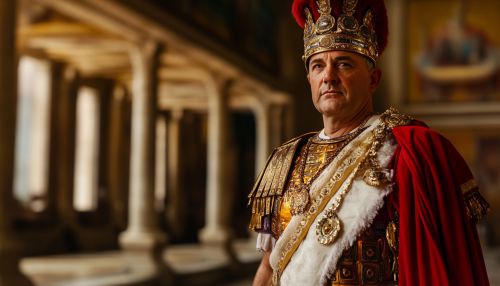Petronius Maximus: Difference between revisions
(Created page with "== Early Life and Background == Petronius Maximus was born around 396 AD into a prominent Roman family, the Anicii, which was one of the most illustrious senatorial families of the late Roman Empire. His father, Anicius Probinus, held the consulship in 395 AD, and his mother was a member of the noble family of the Petronii. The Anicii family was known for its wealth and influence, which provided Maximus with a privileged upbringing and access to the highest echelons of...") |
No edit summary |
||
| (One intermediate revision by the same user not shown) | |||
| Line 17: | Line 17: | ||
Maximus's rise to power was not without controversy. He was rumored to have been involved in the assassination of Valentinian III, although there is no definitive evidence to support this claim. Nevertheless, his accession to the throne was met with resistance from some quarters, particularly from the military, which had its own candidates for the imperial office. | Maximus's rise to power was not without controversy. He was rumored to have been involved in the assassination of Valentinian III, although there is no definitive evidence to support this claim. Nevertheless, his accession to the throne was met with resistance from some quarters, particularly from the military, which had its own candidates for the imperial office. | ||
[[Image:Detail-98353.jpg|thumb|center|Roman Emperor in traditional attire, standing in a grand hall.|class=only_on_mobile]] | |||
[[Image:Detail-98354.jpg|thumb|center|Roman Emperor in traditional attire, standing in a grand hall.|class=only_on_desktop]] | |||
== Reign as Emperor == | == Reign as Emperor == | ||
Latest revision as of 08:47, 9 October 2024
Early Life and Background
Petronius Maximus was born around 396 AD into a prominent Roman family, the Anicii, which was one of the most illustrious senatorial families of the late Roman Empire. His father, Anicius Probinus, held the consulship in 395 AD, and his mother was a member of the noble family of the Petronii. The Anicii family was known for its wealth and influence, which provided Maximus with a privileged upbringing and access to the highest echelons of Roman society.
Maximus received a traditional Roman education, which included studies in rhetoric, philosophy, and law. This education prepared him for a career in public service, a common path for young men of his social standing. His early career was marked by a series of administrative and military posts, which allowed him to gain experience and build a network of political allies.
Political Career
Petronius Maximus's political career began in earnest when he was appointed as praetor in 415 AD, a position that involved overseeing public games and festivals. He later served as a quaestor, responsible for financial administration, and as a praefectus urbi, the official in charge of maintaining order in the city of Rome. These roles demonstrated his competence in both civic and financial matters.
In 433 AD, Maximus was appointed as the magister officiorum, a senior administrative position within the imperial court. This role gave him significant influence over the bureaucracy and allowed him to cultivate relationships with other powerful figures in the empire. His career continued to advance, and he was appointed as a consul in 433 AD, a prestigious position that underscored his status within the Roman aristocracy.
Rise to Power
Maximus's ascent to the imperial throne was marked by political intrigue and opportunism. In 455 AD, the Western Roman Emperor Valentinian III was assassinated, leaving a power vacuum in the empire. Maximus, who had been a close advisor to Valentinian, seized the opportunity to claim the throne for himself. He was proclaimed emperor by the Roman Senate, a move that was likely facilitated by his wealth and influence.
Maximus's rise to power was not without controversy. He was rumored to have been involved in the assassination of Valentinian III, although there is no definitive evidence to support this claim. Nevertheless, his accession to the throne was met with resistance from some quarters, particularly from the military, which had its own candidates for the imperial office.


Reign as Emperor
Petronius Maximus's reign as emperor was brief and tumultuous, lasting only 75 days. During this time, he faced numerous challenges, both internal and external. One of his first acts as emperor was to marry Licinia Eudoxia, the widow of Valentinian III, in an attempt to legitimize his claim to the throne. This marriage, however, was unpopular and did little to strengthen his position.
Externally, the Western Roman Empire was under threat from various barbarian groups, most notably the Vandals, who had established a kingdom in North Africa. The Vandal king, Genseric, used the assassination of Valentinian III as a pretext to launch an invasion of Italy. Maximus was unable to mount an effective defense against the Vandal threat, and his lack of military support further weakened his position.
Downfall and Death
The end of Petronius Maximus's reign came swiftly. As the Vandals approached Rome, panic spread throughout the city. Maximus attempted to flee, but he was caught by an angry mob and killed on May 31, 455 AD. His death marked the end of his brief and largely ineffective rule.
The aftermath of Maximus's death saw the sack of Rome by the Vandals, an event that further destabilized the Western Roman Empire. The power vacuum left by his demise led to a period of political instability, with several short-lived emperors succeeding him in rapid succession.
Legacy
Petronius Maximus's legacy is largely defined by his failure to effectively govern the Western Roman Empire during a time of crisis. His brief reign is often seen as a reflection of the broader decline of the Roman Empire, characterized by political fragmentation and external threats.
Despite his shortcomings as an emperor, Maximus's life offers insights into the complexities of Roman politics during the late empire. His rise to power illustrates the role of senatorial families and the importance of wealth and influence in the imperial court. Moreover, his reign highlights the challenges faced by Roman emperors in maintaining control over a vast and diverse empire.
